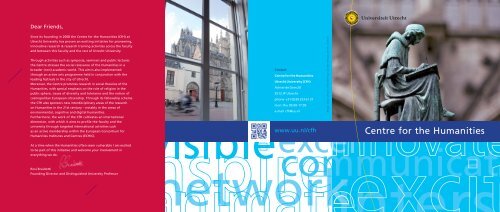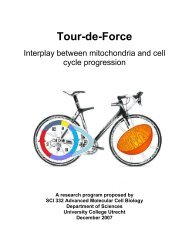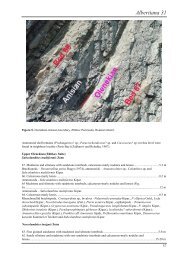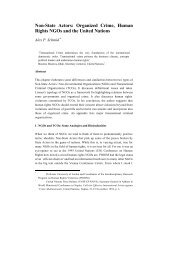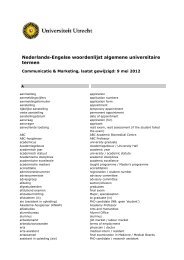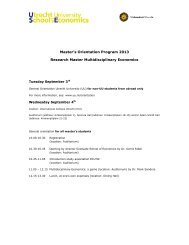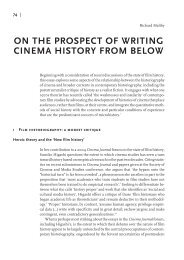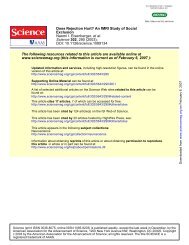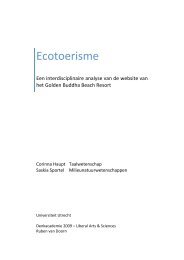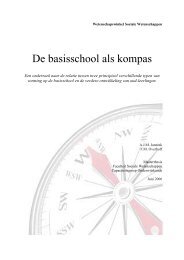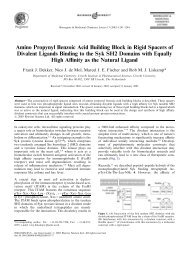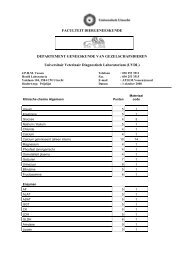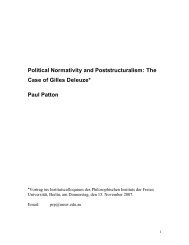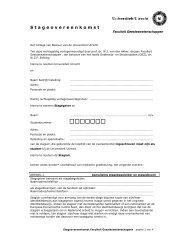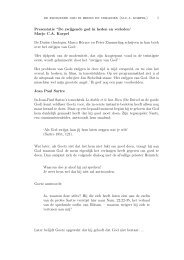Centre for the Humanities
Centre for the Humanities
Centre for the Humanities
You also want an ePaper? Increase the reach of your titles
YUMPU automatically turns print PDFs into web optimized ePapers that Google loves.
Dear Friends,<br />
Since its founding in 2008 <strong>the</strong> <strong>Centre</strong> <strong>for</strong> <strong>the</strong> <strong>Humanities</strong> (CfH) at<br />
Utrecht University has proven an exciting initiative <strong>for</strong> pioneering,<br />
innovative research & research training activities across <strong>the</strong> faculty<br />
and between this faculty and <strong>the</strong> rest of Utrecht University.<br />
Through activities such as symposia, seminars and public lectures<br />
<strong>the</strong> <strong>Centre</strong> stresses <strong>the</strong> social relevance of <strong>the</strong> <strong>Humanities</strong> in a<br />
broader (non) academic world. This aim is also implemented<br />
through an active arts programme held in conjunction with <strong>the</strong><br />
leading festivals in <strong>the</strong> city of Utrecht.<br />
Moreover, <strong>the</strong> <strong>Centre</strong> promotes research in social <strong>the</strong>ories of <strong>the</strong><br />
<strong>Humanities</strong>, with special emphasis on <strong>the</strong> role of religion in <strong>the</strong><br />
public sphere, issues of diversity and tolerance and <strong>the</strong> notion of<br />
cosmopolitan European citizenship. Through its fellowship scheme<br />
<strong>the</strong> CfH also sponsors new interdisciplinary areas of <strong>the</strong> research<br />
on <strong>Humanities</strong> in <strong>the</strong> 21st century – notably in <strong>the</strong> areas of<br />
environmental, cognitive and digital humanities.<br />
Fur<strong>the</strong>rmore, <strong>the</strong> work of <strong>the</strong> CfH cultivates an international<br />
dimension, with which it aims to profile <strong>the</strong> faculty and <strong>the</strong><br />
university through targeted international activities such<br />
as an active membership within <strong>the</strong> European Consortium <strong>for</strong><br />
<strong>Humanities</strong> Institutes and <strong>Centre</strong>s (ECHIC).<br />
Contact<br />
<strong>Centre</strong> <strong>for</strong> <strong>the</strong> <strong>Humanities</strong><br />
Utrecht University (CfH)<br />
Achter de Dom 20<br />
3512 JP Utrecht<br />
phone +31 (0)30 253 61 37<br />
mon-thu 09.00-17.00<br />
e-mail cfh@uu.nl<br />
www.uu.nl/cfh<br />
design: Taluut photo’s: Wieke Eefting, Cornelie Vermaas printer: Zalsman<br />
<strong>Centre</strong> <strong>for</strong> <strong>the</strong> <strong>Humanities</strong><br />
At a time when <strong>the</strong> <strong>Humanities</strong> often seem vulnerable I am excited<br />
to be part of this initiative and welcome your involvement in<br />
everything we do.<br />
Rosi Braidotti<br />
Founding Director and Distinguished University Professor
“All of our work on ‘<strong>the</strong><br />
academic and <strong>the</strong> civic’<br />
takes place in <strong>the</strong> frame<br />
of a programme on<br />
The <strong>Centre</strong> <strong>for</strong> <strong>the</strong> <strong>Humanities</strong> has<br />
over 20 active Utrecht fellows; This<br />
is next to 4 senior advisors; The CfH<br />
board consists of 4 senior Utrecht staff<br />
members; and <strong>the</strong> <strong>Centre</strong>’s director is<br />
supported by 3 staff members.<br />
cosmopolitan citizenship<br />
and <strong>the</strong> respect <strong>for</strong> cultural<br />
diversity. These are <strong>the</strong><br />
pillars to build a progressive<br />
approach to social<br />
sustainability”<br />
Rosi Braidotti, Autumn 2011<br />
Interfaces Between<br />
<strong>the</strong> Sciences and <strong>the</strong><br />
<strong>Humanities</strong><br />
This research <strong>the</strong>me focuses on <strong>the</strong> relevance<br />
of <strong>the</strong> <strong>Humanities</strong> <strong>for</strong> <strong>the</strong> contemporary<br />
world. It critically deals with <strong>the</strong> diversity of<br />
genealogies of <strong>the</strong> <strong>Humanities</strong>, not only<br />
within Europe, but also in a comparative global<br />
perspective. The focus is on <strong>the</strong> scientific<br />
trans<strong>for</strong>mations of <strong>the</strong> <strong>Humanities</strong> in <strong>the</strong> 21st<br />
century, in new cutting-edge perspectives<br />
such as: digital humanities, cognition and<br />
<strong>the</strong> neural sciences and <strong>the</strong> question of <strong>the</strong><br />
post human.<br />
CfH investigates <strong>the</strong>se <strong>the</strong>mes and <strong>the</strong> new<br />
<strong>for</strong>ms of interaction between <strong>the</strong> <strong>Humanities</strong>,<br />
<strong>the</strong> Social and <strong>the</strong> Natural Sciences so as<br />
to develop a culture of mutual respect across<br />
<strong>the</strong>se disciplines.<br />
Social Sustainability<br />
and <strong>the</strong> <strong>Humanities</strong><br />
This interdisciplinary research <strong>the</strong>me concentrates<br />
on social and cultural <strong>the</strong>ories of sustainability<br />
in <strong>the</strong> contemporary world, with special<br />
emphasis on studies of globalisation and<br />
<strong>the</strong>ir impact on our shared understanding<br />
of <strong>the</strong> human condition, its place in planetary<br />
history and our ability to self-destruct as well<br />
as to construct sustainable futures.<br />
This project aims at assessing <strong>the</strong> specific and<br />
original contribution of <strong>the</strong> <strong>Humanities</strong> to this<br />
debate in <strong>the</strong> following areas: Environmental<br />
history; Literary and cultural Eco-criticism; Media<br />
Ecologies; Environmental Media; Environmental<br />
Ethics and Environmental Theology. It focuses<br />
on <strong>the</strong> analysis of <strong>the</strong> conditions that may induce<br />
social and political changes towards sustainable<br />
life styles.<br />
The Academic<br />
and <strong>the</strong> Civic<br />
This research <strong>the</strong>me investigates <strong>the</strong> changing<br />
relations between <strong>the</strong> university as <strong>the</strong> location<br />
of academic and scientific excellence and its<br />
civic environment, i.e. its social, cultural and<br />
political contexts.<br />
It <strong>for</strong>egrounds <strong>the</strong> social responsibility of <strong>the</strong><br />
university in <strong>the</strong> contemporary world.<br />
More concretely <strong>the</strong> <strong>the</strong>me promotes a<br />
cosmopolitan practice of citizenship with<br />
respect to cultural diversity, social sustainability<br />
and human rights through a writers-in-residence<br />
programme and a festival fellowship scheme.<br />
‘The Academic and <strong>the</strong> Civic’ rests on <strong>the</strong><br />
assumption that higher education in <strong>the</strong><br />
twenty-first century requires <strong>the</strong> cultivation of<br />
creative and critical thinking as well as more<br />
technical academic skills.<br />
Within Utrecht University <strong>the</strong> CfH<br />
collaboraties with more than 15<br />
departments, schools and research areas;<br />
In civil society it has 12 Utrecht<br />
cultural partners; The <strong>Centre</strong> is an active<br />
member of 2 major international<br />
<strong>Humanities</strong> organization; Within <strong>the</strong>se<br />
<strong>the</strong> CfH cooperates with more than<br />
40 humanities institutes worldwide.


